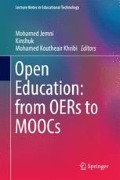Abstract
In this chapter, we discuss why open educational resources (OER) and MOOCs are a necessary and powerful combination, especially in German-speaking Europe. We begin with an introduction to open online courses and an overview of copyright law in Germany and Austria. We then describe the evolution of OER MOOCs in Austria and Germany, especially the development of two MOOC platforms. Finally, we present examples of the impact of OER on MOOCs to conclude that an approach combining OER and MOOCs can be very valuable to foster new and innovative didactical approaches as well as future education.
Access this chapter
Tax calculation will be finalised at checkout
Purchases are for personal use only
References
Bremer, C. & Robes, J. (2012). Open Educational Resources und Massive Open Online Courses: Neues Lernen in und mit der Datenwolke. In: Hessische Blätter für Volksbildung: Neue Medien als Infrastruktur des Lernens. Zeitschrift für Erwachsenenbildung in Deutschland, 04/2012, pp. 315–334.
Bündnis Freie Bildung (2015). Positionspapier: Der Weg zur Stärkung freier Bildungsmaterialien. Positionspapier (Februar 2015). available at http://buendnis-freie-bildung.de/positionspapier-oer/ (2015-05-05) (last visited October 2015).
Carson, S. & Schmidt, J. (2012). The massive open online professor academic matter. Journal of Higher Education. Retrieved January, 2nd 2012. Available at http://www.academicmatters.ca/2012/05/the-massive-open-online-professor/ (last visited October 2015).
Caswell, T., Henson, S., Jensen, M., & Wiley, D. (2008). Open educational resources: Enabling universal education. International Review of Research in Open and Distance Learning, 9(1), 1–11.
Cheverie, J. (2013). Copyright challenges in a MOOC environment. https://net.educause.edu/ir/library/pdf/pub9014.pdf (last visited October 2015).
Ebner, M. & Schön, S. (2011). Lernressourcen: Frei zugänglich und einsetzbar. In: Handbuch E-Learning - Expertenwissen aus Wissenschaft und Praxis – Strategie, Instrumente, Fallstudien, pp. 1–14.
Ebner, M., Schön, S., & Käfmüller, K. (2015). Inverse Blended Learning bei „Gratis Online Lernen“ – über den Versuch, einen Online-Kurs für viele in die Lebenswelt von EinsteigerInnen zu integrieren. In N. Nistor & S. Schirlitz (Eds.), Digitale Medien und Interdisziplinarität (pp. 197–206). Münster: Waxmann.
Ebner, M., & Stöckler-Penz, C. (2011). Open Educational Resources als Lifelong-Learning-Strategie am Beispiel der TU Graz. In N. Tomaschek & E. Gornik (Eds.), The lifelong learning university (pp. 53–60). Oldenburg: Waxmann.
Geser, G. (2007). Open educational practices and resources- OLCOS roadmap 2012. Salzburg. URL: http://www.olcos.org/english/roadmap/. (last visited October 2015)
Hansen, J. & Seehagen-Marx, H. (2013). Urheberrecht & Co. in der Hochschullehre – Rechtliche Aspekte des Technologieeinsatzes beim Lehren und Lernen, In: M. Ebner & S. Schön (Eds.), Lehrbuch für Lernen und Lehren mit Technologien (pp. 435–443), Norderstedt.
Ho, A. D., Chuang, I., Reich, J., Coleman, C., Whitehill, J., & Northcutt, C. et al. (2015). HarvardX and MITx: Two years of open online course. doi:10.2139/ssrn.2586847
Hollands, F. M. & Tirthali, D. (2014). MOOCs: expectations and reality. Full report. Center for Benefit-Cost Studies of Education, Teachers College. NY: Columbia University. https://oerknowledgecloud.org/sites/oerknowledgecloud.org/files/MOOCs_Expectations_and_Reality.pdf (last visited October 2015).
Hylén, J. (2006). Open educational resources: Opportunities and challenges. Open Education, 2006, 49–63.
Johnstone, S. M. (2005). Open educational resources serve the world. Educause Quarterly, 28(3), 15–18.
Kerres, M., & Preußler, A. (2013). Zum didaktischen Potenzial der Vorlesung: Auslaufmodell oder Zukunftsformat. In G. Reinmann, S. Schön, & M. Ebner (Eds.), Hochschuldidaktik im Zeichen der Heterogenität und Vielfalt (pp. 79–97). Norderstedt: BOD.
Lehmann, B. (2013). MOOCs – Versuch einer Annäherung. In: R. Schulmeister (Ed.), MOOCs—Massive Open Online Courses. Offene Bildung oder Geschäftsmodell? (pp. 209–238). Münster: Waxmann.
Lorenz, A., Wittke, A., Muschal, T. & Steinert, F. (2015). From Moodle to mooin: Development of a MOOC platform. In: European MOOCs Stakeholder Summit (EMOOCs) (pp. 102–106). Mons, Belgium: p.a.u. education.
Rodriguez, O. (2013). The concept of openness behind c and x-MOOCs (massive open online courses). Open Praxis, 5(1), 67–73.
Schaffert, S. (2010). Strategic integration of open educational resources in higher education. Objectives, case studies, and the impact of Web 2.0 on universities. In U.-D. Ehlers & D. Schneckenberg (Eds.), Changing cultures in higher education—moving ahead to future learning (pp. 119–131). New York: Springer.
Schulmeister, R. (2013). Der Beginn und das Ende von OPEN. Chronologie der MOOC-Entwicklung. In: ibid. (Ed.), MOOCs – Massive Open Online Courses. Offene Bildung oder Geschäftsmodell (pp. 17–59). Münster: Waxmann.
Author information
Authors and Affiliations
Corresponding author
Editor information
Editors and Affiliations
Rights and permissions
Copyright information
© 2017 Springer-Verlag Berlin Heidelberg
About this chapter
Cite this chapter
Ebner, M. et al. (2017). How OER Enhances MOOCs—A Perspective from German-Speaking Europe. In: Jemni, M., Kinshuk, Khribi, M. (eds) Open Education: from OERs to MOOCs. Lecture Notes in Educational Technology. Springer, Berlin, Heidelberg. https://doi.org/10.1007/978-3-662-52925-6_11
Download citation
DOI: https://doi.org/10.1007/978-3-662-52925-6_11
Published:
Publisher Name: Springer, Berlin, Heidelberg
Print ISBN: 978-3-662-52923-2
Online ISBN: 978-3-662-52925-6
eBook Packages: EducationEducation (R0)

